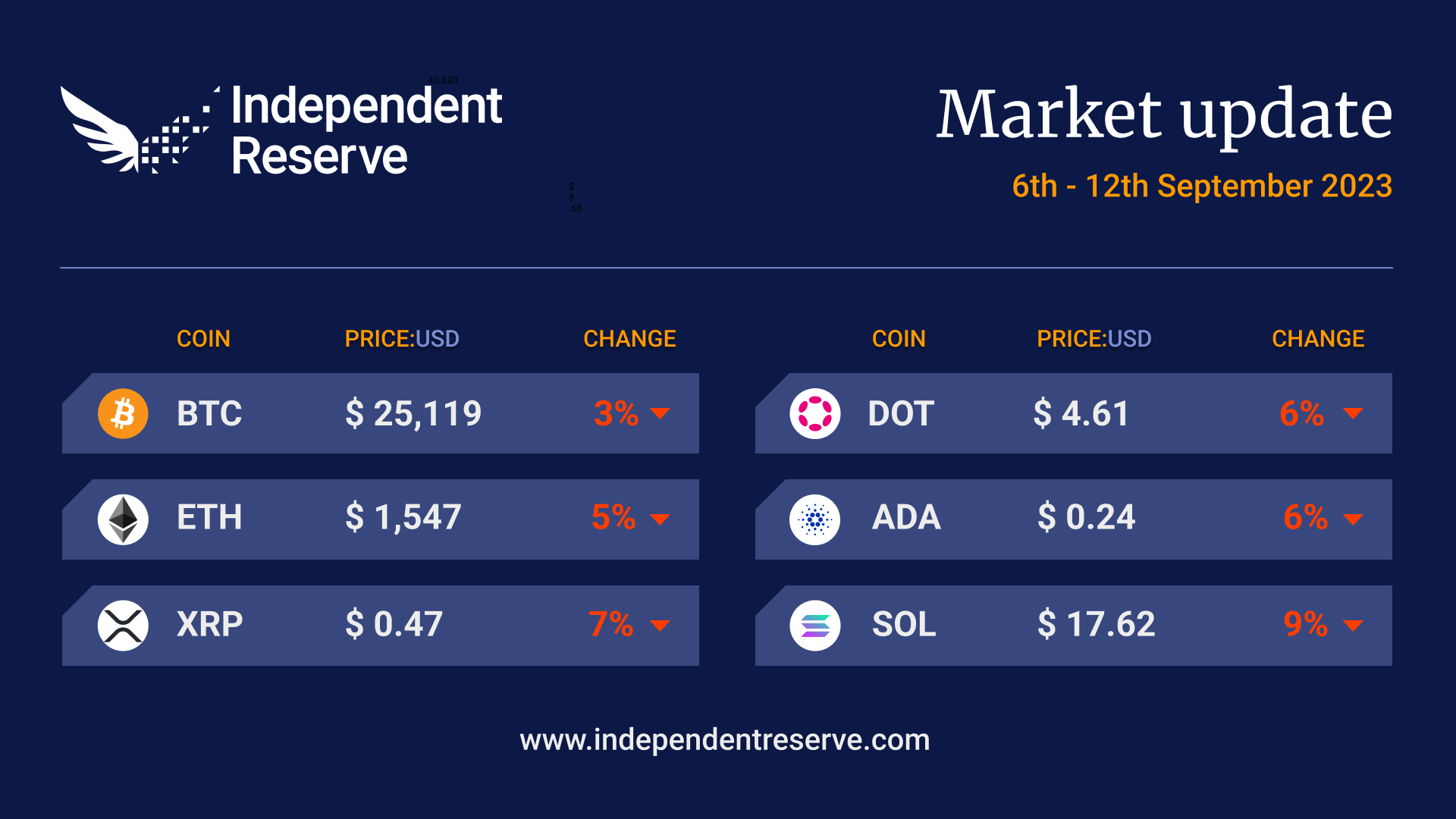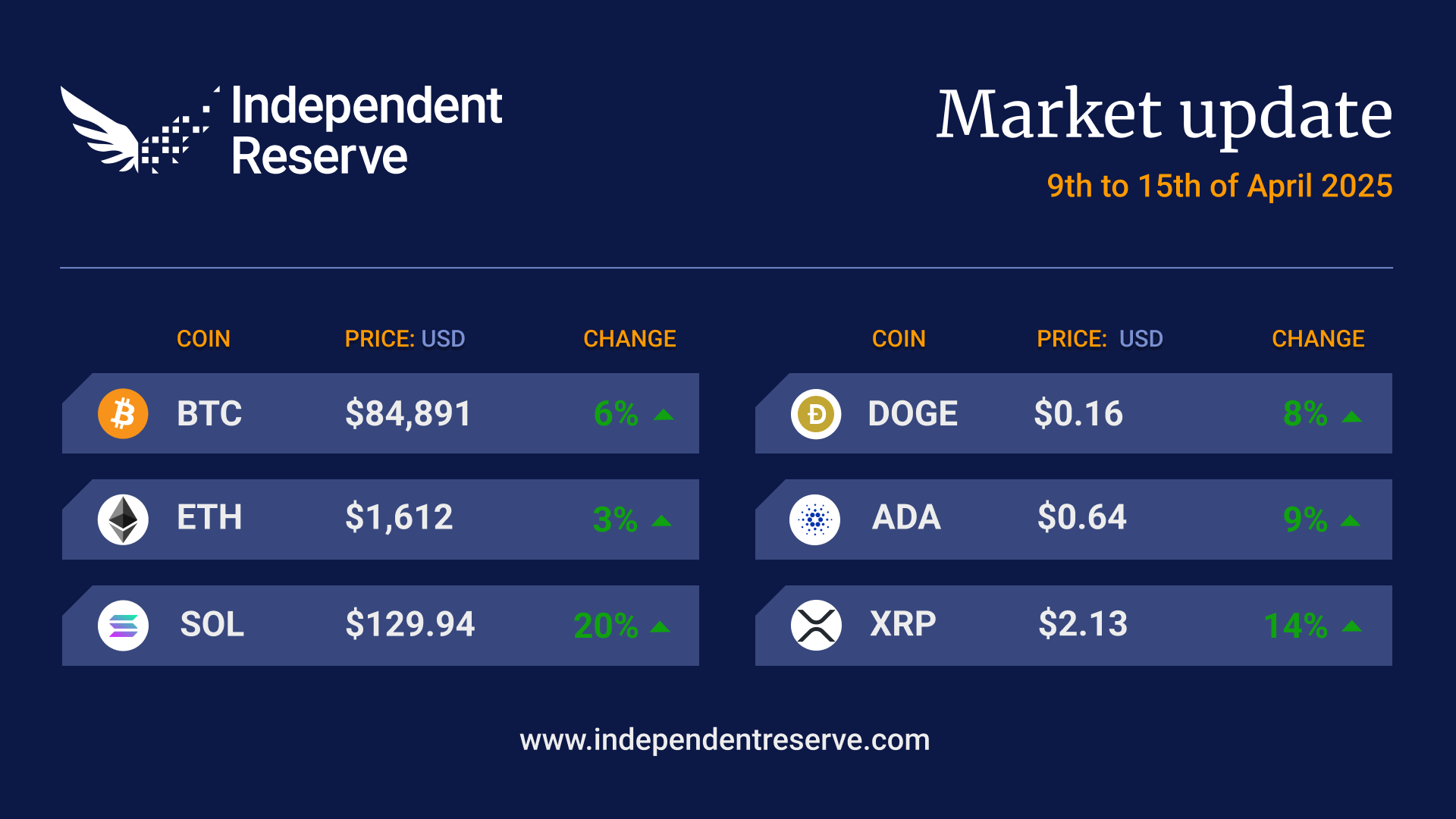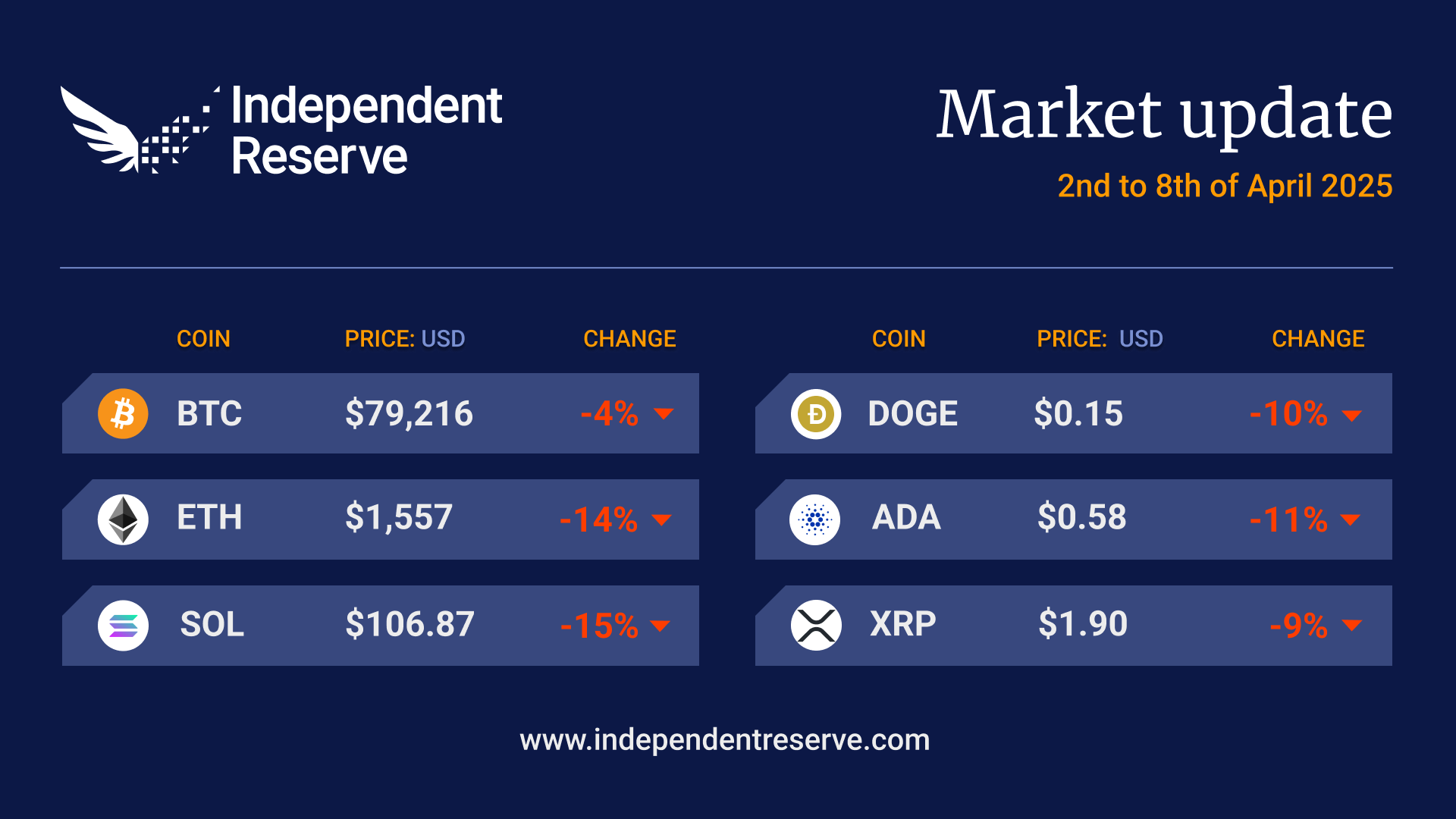In Markets
September continues its reputation as “Downtember” on our Bitcoin exchange, with the markets down again this week Looming “death crosses” for Ethereum and Bitcoin sparked another debate over whether it was a portent of doom, or whether charting was merely astrology for men. Bitcoin finishes the week down 3% at A$39,128 (US$25,119), while Ethereum dropped 5% to A$2,409 (US$1,547). Both are about 13-15% down on a month ago. XRP lost 7%, Cardano fell 6%, Dogecoin (-4%) and Solana fell 9% on fears of an FTX selloff. The Crypto Fear and Greed Index is steady at 40, or Fear.

In headlines
Token 2049
Token2049 is one of Asia’s largest crypto events, bringing together leading voices in the Web3 industry. This year, it will be held in Singapore on 13-14 September.
The Independent Reserve team will be attending TOKEN2049 to meet with clients, partners, and other industry leaders. Visiting 2049? Connect with our team if you have questions or would like to catch up.
CFTC no longer the “good regulator”
The US Commodities and Futures Trading Commission announced settlements with three DeFi companies this week, ZeroEx, Opyn and Deridex, for various offences relating to offering digital commodities derivatives trading without being regulated exchanges. Interestingly CFTC Commissioner Summer K. Mersinger dissented against the actions. The penalties imposed were fairly light: Opyn will cough up $250K, ZeroEx $200K, and Deridex $100K. However, the news shook the crypto industry due to the potential ramifications. Gabriel Shapiro, general counsel at Delphi Labs warned: “If you run any kind of interface for a DeFi credit protocol, block the US. Many people told me I was crazy when I said that the CFTC’s case against Ooki DAO simply makes DeFi illegal under the CFTC’s view of US law. I was right – they were wrong,” Shapiro said. The Blockchain Association’s Jake Chervinsky said the cases have laid to rest the idea that the CFTC is “a better regulator” than the SEC. “Today, the CFTC violated the court’s opinion in the Uniswap class action—and its own principles—in an attack on DeFi.”
Ethereum is undervalued
Fidelity Investment’s crypto arm has issued a report claiming that Ethereum is currently undervalued and trading at a discount. The Ethereum Investment Thesis lays out the case that with a 120 million supply of ETH bringing in annual fees of US$6.4B (A$10B) the fair value of ETH is actually US$2,090 (A$3,275) under a discounted cash flow model. It’s currently US$1,547 (A$2,409). Better yet, Fidelity forecasts a big surge in network activity over the coming years to reach US$20B (A$31.3B) in fees by 2030.
Activity on Ethereum not so good
The bear market is taking a toll on activity on Ethereum, with fees dropping to their lowest level since January. Part of the reason is the ever-deepening NFT bear market, with DappRadar figures showing the combined value of monthly NFT trading is down 70% since March and transaction volume itself falling by 45%. Spot trading on decentralised exchanges also dropped last month to the lowest level since December 2020, according to The Block. The ETH supply flipped to inflationary, as there were not enough fees to burn, and 3,750 ETH has been added to the supply since September 1. On the upside, the amount of ETH locked in the deposit contracts for staking hit a new high of 28.7 million.

Decentralised Infura
Consensys Hhead of strategy product Simon Morris has revealed that Decentralised Infura will launch by the end of the year – and hinted Google Cloud and AWS may join. Infura provides backend access to Ethereum for projects that don’t want to run a node (i.e. most of them), meaning that when it goes down, half of DeFi stops working and Metamask breaks. The new plan is to have a network of different providers offering the same thing, meaning US regulators can’t shut down DeFi by going after Infura. It will launch under centralised control while they iron out the kinks, and the plan is to then decentralise control next year under a DAO or a Foundation.
No crypto bill Bragging rights
A senate committee has put the kiboshkybosh on Liberal Senator Andrew Bragg’s crypto regulation bill, saying that it lacks detail, was “not congruent with international regimes” and caused “genuine concern for regulatory arbitrage and adverse outcomes to the industry.” Instead, the committee recommended the government “continue to consult with industry on the development of fit-for-purpose digital assets regulation in Australia.”
Rumours
A rumour apparently started by WhaleChart suggests that FTX is set to get permission to start liquidating up to $200M (A$313M) worth of crypto each week – and it had US$3.4B (A$5.3B) in assets back in April. There appears to have been a sell-off of Solana as a result, even though the majority of FTX’s SOL is locked.
Privacy pools for legit coin mixing
Ethereum co-founder Vitalik Buterin has coauthored a new paper on using privacy pools and zero-knowledge proofs to essentially create a legitimate version of coin mixer Tornado cash (local project Portal Gate is working on a similar idea). All users of the pool would use ZK proofs to show they have a legitimate source for their funds. “In many cases, privacy and regulatory compliance are perceived as incompatible. This paper suggests that this does not necessarily have to be the case.”
Bitcoin going down the tubes
Former Bitcoin permabull Mike McGlone, Bloomberg Intelligence’s senior macro strategist, has issued a gloomy forecast for Bitcoin. He says Bitcoin’s failure to lift despite the renewed potential for Bitcoin ETFs could be a sign a liquidity crisis is coming. He noted Bitcoin came of age during the zero interest years, and may fare badly with higher interest rates. “Down about 15% in 3Q to September 6th despite US spot ETFs moving closer to approval and a buoyant stock market. Bitcoin may be telling us something. The 24/7 traded crypto might be a leading indicator for a severe economic reset worthy of the extraordinary pump -and then dump – in liquidity.”
Bitcoin bull run already on
Former BitMEX CEO Arthur Hayes knows how to rev up the crypto crowd with his presentation at Korean Blockchain Week. Hayes told the crowd the Bitcoin bull run had started in March when Silicon Valley bank collapsed and the Fed created the Bank Term Funding Program, which Hayes likened to money printing. “We basically ditched this whole facade that we care about the value of the dollar and the value of any fiat currency,” he said. He suggested investors will realise within six to 12 months that fixed supply assets like Bitcoin are the only answer.

G20 pushes forward with international crypto framework
The G20 is calling for a swift implementation of a cross-border framework for crypto assets set to begin in 2027. This framework would enable the automatic annual exchange of information on crypto transactions between jurisdictions, including those on unregulated exchanges and wallet providers, among member countries such as Argentina, Australia, Brazil, Canada, the UK, US and the EU.


